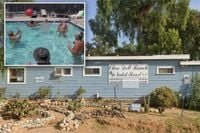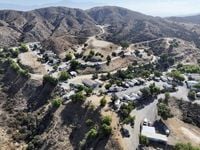For more than 70 years, Olive Dell Ranch nestled in the San Jacinto foothills of San Bernardino County, California, was a rare sanctuary for naturists—a 136-acre retreat where residents could live unclothed, free from judgment, and surrounded by like-minded individuals. Founded in 1952, the ranch offered mobile-home and RV living, a pool, trails, a restaurant, and a clubhouse, all centered around the idea that nudity was natural, healthy, and liberating. For generations, the Olive Dell community thrived on a philosophy of body acceptance and harmony with nature, drawing retirees, veterans, and others seeking a peaceful, welcoming environment.
That peace was abruptly shattered after new owners Mark Glasier, Brian Cleland, and Tina Coffelt purchased the property in 2019 for $2.65 million, according to reporting by KTLA and The Guardian. In the years that followed, residents allege, the very heart of their community came under siege. What began as subtle changes in management soon spiraled into a clash over identity, rights, and the future of the ranch itself.
According to a lawsuit filed in California state court by more than 50 current and former residents, the new owners reneged on promises to preserve Olive Dell’s naturist heritage. Instead, plaintiffs say, management mocked the community as “nasty people,” raised rents, threatened eviction, and let the facilities fall into disrepair. “This at its heart is an anti-discrimination case,” Frances M. Campbell, an attorney representing the residents, told The Guardian. The complaint alleges violations of civil rights, elder abuse, unfair business practices, financial exploitation, and a conspiracy to drive out the nudist community in order to increase the land’s value.
Residents contend things took a sharp turn in January 2023, when Tina Coffelt assumed greater control over daily operations. The ranch was renamed “Olive Dell RV Park and Resort,” a move residents say was designed to circumvent protections under California’s Mobilehome Residency Law. This law limits rent increases, utility markups, and arbitrary evictions—protections that plaintiffs argue were essential for the largely fixed-income, elderly, and disabled population that called Olive Dell home.
By late 2024, the situation had reached a boiling point. Management announced that Olive Dell would become a “textile” park, requiring clothing at all times beginning January 6, 2025. For many, this was more than a rule change; it was an existential threat. “Being forced into clothes is like forcing a religious group to abandon its rituals,” one resident told The Guardian. The lawsuit describes this as a “substantial cultural shift” that stripped the ranch of its founding purpose.
But the clothing mandate was only the tip of the iceberg. Residents allege that the new owners systematically neglected maintenance and basic services. The pool, once a hub of community life, turned green with algae. The sauna and restaurant were closed. Trash piled up, tennis courts and roads deteriorated, and rodent and insect infestations became common. Communal spaces like the clubhouse, bathrooms, and spa were shuttered. Water systems were neglected, leaving people without potable water in the hot, fire-prone foothills. “They are basically making the place as nice as they can with their own money and labor and hoping this lawsuit changes something,” Campbell told The Guardian.
According to court documents reviewed by Beritaja, residents and guests received informal eviction notices, often for alleged violations of new rules. Rents, previously ranging from $550 to $850 per month, were advertised to newcomers at $900 or more. Electrical meters were replaced with new units that, residents say, doubled or tripled their bills, with the excess allegedly pocketed by the owners. Some who tried to install surveillance cameras near their homes faced $400 monthly monitoring charges. As maintenance lapsed, residents stepped in themselves, restoring the pool and patching roads, but the situation only worsened.
Community events—once the lifeblood of Olive Dell—were canceled in early 2024. Dues-paying members were banned from entering the premises without refunds. The sense of belonging and safety that defined Olive Dell began to unravel. “This is a community of retired elderly, veterans, and disabled individuals who really have no other place to go,” Campbell explained to Beritaja. Many residents, like Marine Corps veteran Chet Smith, recalled a vibrant calendar of pride events, concerts, and night hikes. “We hosted pride events, mini concerts, comedians and bands,” Smith said. “We had night hiking and even a 5K run. The calendar was always full.”
Then, in August 2024, tragedy struck. Resident Michael Royce Sparks was arrested and charged with the brutal killing of two neighbors, Daniel and Stephanie Menard, on site. The chaos of the arrest left Sparks’ residence destroyed, and, according to the lawsuit, the owners refused to clean up or secure the crime scene. The debris remained, and the main entrance’s gate broke, leaving the ranch exposed to curious outsiders and compounding residents’ trauma. “We were all still dealing with the trauma of Sparks and the Menards and now you had people coming in, lookie-loos who wanted to visit the crime scene,” said co-plaintiff Veronica P. “We were also used to having protection; now anyone could just come in and gawk.”
The lawsuit, filed in San Bernardino County Superior Court, includes 56 plaintiffs—tenants, dues-paying members, and guests—alleging civil rights violations, elder abuse, unfair business practices, labor code violations, negligence, breach of contract, and more. Plaintiffs are seeking at least $5 million in damages and an injunction to restore Olive Dell’s status as a nudist park. The next court date is scheduled for September 29, 2025.
For many, the stakes are deeply personal. The ranch was not just a place to live, but a sanctuary for acceptance and self-discovery. “This was a place of healing and self-discovery,” said Veronica P., who moved to Olive Dell in March 2024. “I found my community here, a place of loving, supportive and empathetic people. Nudist or not, that’s hard to find.”
As the legal battle looms, the future of Olive Dell Ranch—and the very identity of its community—hangs in the balance. For longtime residents, the fight is about far more than clothing. It’s about preserving a way of life that, for decades, offered freedom, dignity, and belonging in the California hills.


